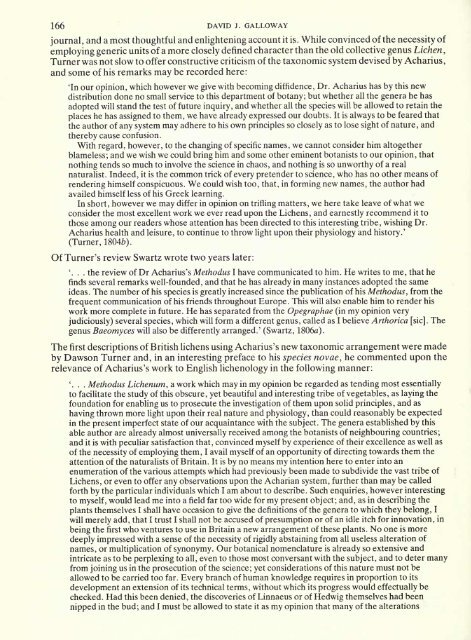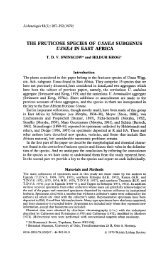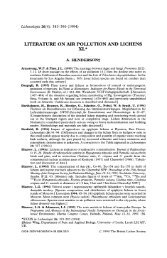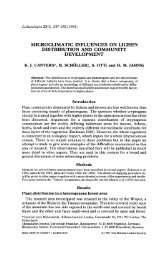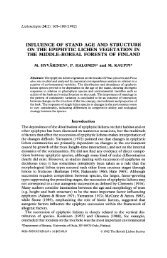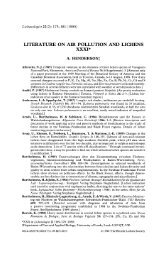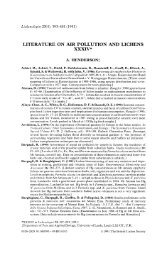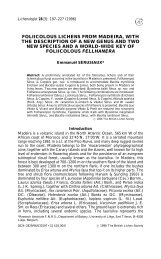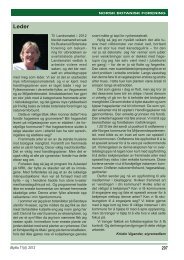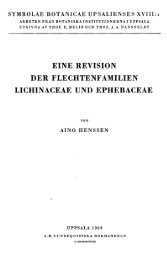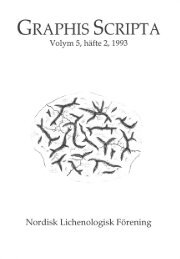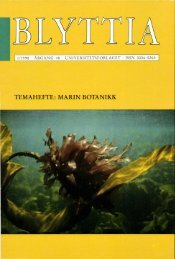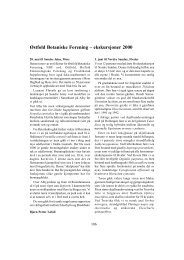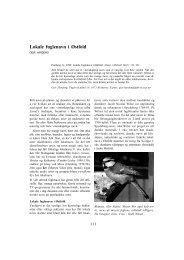British Museum (Natural History)
British Museum (Natural History)
British Museum (Natural History)
Create successful ePaper yourself
Turn your PDF publications into a flip-book with our unique Google optimized e-Paper software.
166 DAVID J. GALLOWAY<br />
journal, and a most thoughtful and enlightening account it is. While convinced of the necessity of<br />
employing generic units of a more closely defined character than the old collective genus Lichen,<br />
Turner was not slow to offer constructive criticism of the taxonomic system devised by Acharius,<br />
and some of his remarks may be recorded here:<br />
'In our opinion, which however we give with becoming diffidence, Dr. Acharius has by this new<br />
distribution done no small service to this department of botany; but whether all the genera he has<br />
adopted will stand the test of future inquiry, and whether all the species will be allowed to retain the<br />
places he has assigned to them, we have already expressed our doubts. It is always to be feared that<br />
the author of any system may adhere to his own principles so closely as to lose sight of nature, and<br />
thereby cause confusion.<br />
With regard, however, to the changing of specific names, we cannot consider him altogether<br />
blameless; and we wish we could bring him and some other eminent botanists to our opinion, that<br />
nothing tends so much to involve the science in chaos, and nothing is so unworthy of a real<br />
naturalist. Indeed, it is the common trick of every pretender to science, who has no other means of<br />
rendering himself conspicuous. We could wish too, that, in forming new names, the author had<br />
availed himself less of his Greek learning.<br />
In short, however we may differ in opinion on trifling matters, we here take leave of what we<br />
consider the most excellent work we ever read upon the Lichens, and earnestly recommend it to<br />
those among our readers whose attention has been directed to this interesting tribe, wishing Dr.<br />
Acharius health and leisure, to continue to throw light upon their physiology and history.'<br />
(Turner, 18046).<br />
Of Turner's review Swartz wrote two years later:<br />
'. . . the review of Dr Acharius's Methodus I have communicated to him. He writes to me, that he<br />
finds several remarks well-founded, and that he has already in many instances adopted the same<br />
ideas. The number of his species is greatly increased since the publication of his Methodus, from the<br />
frequent communication of his friends throughout Europe. This will also enable him to render his<br />
work more complete in future. He has separated from the Opegraphae (in my opinion very<br />
judiciously) several species, which will form a different genus, called as I believe Arthorica [sic]. The<br />
genus Baeomyces will also be differently arranged.' (Swartz, 18060).<br />
The first descriptions of <strong>British</strong> lichens using Acharius's new taxonomic arrangement were made<br />
by Dawson Turner and, in an interesting preface to his species novae, he commented upon the<br />
relevance of Acharius's work to English lichenology in the following manner:<br />
'. . . Methodus Lichenum, a work which may in my opinion be regarded as tending most essentially<br />
to facilitate the study of this obscure, yet beautiful and interesting tribe of vegetables, as laying the<br />
foundation for enabling us to prosecute the investigation of them upon solid principles, and as<br />
having thrown more light upon their real nature and physiology, than could reasonably be expected<br />
in the present imperfect state of our acquaintance with the subject. The genera established by this<br />
able author are already almost universally received among the botanists of neighbouring countries;<br />
and it is with peculiar satisfaction that, convinced myself by experience of their excellence as well as<br />
of the necessity of employing them, I avail myself of an opportunity of directing towards them the<br />
attention of the naturalists of Britain. It is by no means my intention here to enter into an<br />
enumeration of the various attempts which had previously been made to subdivide the vast tribe of<br />
Lichens, or even to offer any observations upon the Acharian system, further than may be called<br />
forth by the particular individuals which I am about to describe. Such enquiries, however interesting<br />
to myself, would lead me into a field far too wide for my present object; and, as in describing the<br />
plants themselves I shall have occasion to give the definitions of the genera to which they belong, I<br />
will merely add, that I trust I shall not be accused of presumption or of an idle itch for innovation, in<br />
being the first who ventures to use in Britain a new arrangement of these plants. No one is more<br />
deeply impressed with a sense of the necessity of rigidly abstaining from all useless alteration of<br />
names, or multiplication of synonymy. Our botanical nomenclature is already so extensive and<br />
intricate as to be perplexing to all, even to those most conversant with the subject, and to deter many<br />
from joining us in the prosecution of the science; yet considerations of this nature must not be<br />
allowed to be carried too far. Every branch of human knowledge requires in proportion to its<br />
development an extension of its technical terms, without which its progress would effectually be<br />
checked. Had this been denied, the discoveries of Linnaeus or of Hedwig themselves had been<br />
nipped in the bud; and I must be allowed to state it as my opinion that many of the alterations


